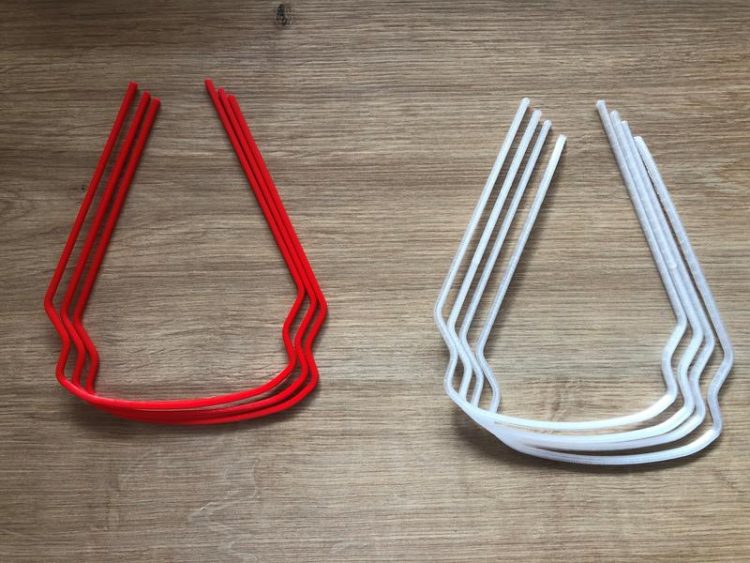Rapid help for hospitals

3D print sample of side pieces for safety goggles made from PLA and PC. Fraunhofer IPA
Hospitals are currently facing shortages of many medical consumables, not just face masks. Rapid help is needed. These are problems with which the Project Group for Automation in Medicine and Biotechnology PAMB, Mannheim, a spin-off from Fraunhofer IPA, is well acquainted.
After all, it engages with medical professionals on a daily basis. Its headquarters are located at the heart of the grounds that house Mannheim University Hospital and it has a coronavirus diagnosis station right outside its window. The project group’s medical technicians have provided rapid, direct support to the doctors.
Protective goggles in short supply
Protective goggles are above all in short supply – a mass product for single use. They are similar to welding goggles and consist of a frame and a transparent plastic screen. Although there is no shortage of screens in the hospital, there has been a lack of frames.
Even though these plastic components are not high-tech products, they still need to comply with the quality specifications – familiar ground for IPA scientists as they are well acquainted with risk assessments and guidelines in medical technology.
A prototype was quickly developed, manufactured and clinically tested for usability: The tests proved that it could be sterilized and did not cause skin irritation. It was not long before the Project Group was able to provide an initial sample to the doctors. These samples were highly successful and the hospital requested 500 units.
But this was not so simple. Although the Project Group has its own 3D printer which can manufacture plastic components such as these, it is unable to make more than 20 frames per day, even when working around the clock. This is where the Mannheim-based company Hänssler Kunststoff- und Dichtungstechnik GmbH comes in.
Over the weekend, it manufactured an initial batch, which has now been delivered and is being used in the university hospital. The Project Group will also be able to step in and help other hospitals if required.
Disinfectant dispensers from the printer
And that is far from all. The Project Group is also helping to produce disinfectant dispensers. While the nearby chemicals group BASF is providing enough disinfectant, dispensers have come to be in short supply. The team at Fraunhofer have produced a prototype of this as well and are set to manufacture between 100 and 150 units.
Own brand ventilators
Many of the Project Group members are now working from home, but this has not stopped them tackling the coronavirus outbreak on yet another front. Coordinated by Fraunhofer, the Project Group is aiming to have developed an alternative emergency ventilator within a few weeks.
It is likely to comprise suitable materials that will also be in good supply throughout the crisis in addition to components that can be easily manufactured, so that the solution can be rapidly used as an alternative in regions experiencing ventilator shortages.
The aim is to have the documents for an operational device ready as soon as the end of April and then make these available alongside the training documents.
Media Contact:
Axel Storz
Phone +49 711 970-3660
axel.storz@ipa.fraunhofer.de
Johannes Horsch
Phone +49 621 17207146
johannes.horsch@ipa.fraunhofer.de
Dr.-Ing. Jens Langejürgen
Phone +49 621 17207187
jens.langejuergen@ipa.fraunhofer.de
Media Contact
All latest news from the category: Health and Medicine
This subject area encompasses research and studies in the field of human medicine.
Among the wide-ranging list of topics covered here are anesthesiology, anatomy, surgery, human genetics, hygiene and environmental medicine, internal medicine, neurology, pharmacology, physiology, urology and dental medicine.
Newest articles

Superradiant atoms could push the boundaries of how precisely time can be measured
Superradiant atoms can help us measure time more precisely than ever. In a new study, researchers from the University of Copenhagen present a new method for measuring the time interval,…

Ion thermoelectric conversion devices for near room temperature
The electrode sheet of the thermoelectric device consists of ionic hydrogel, which is sandwiched between the electrodes to form, and the Prussian blue on the electrode undergoes a redox reaction…

Zap Energy achieves 37-million-degree temperatures in a compact device
New publication reports record electron temperatures for a small-scale, sheared-flow-stabilized Z-pinch fusion device. In the nine decades since humans first produced fusion reactions, only a few fusion technologies have demonstrated…





















